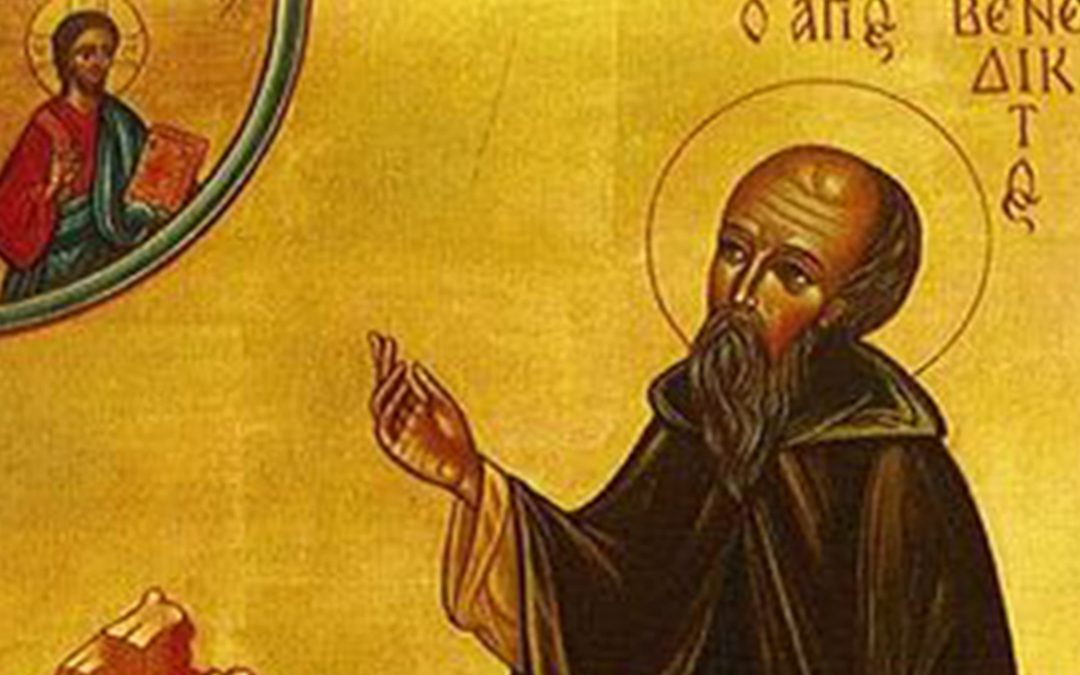Dear friends,
During these long summer days, I invite us to learn from the founder of another of our local religious communities. I frequently use St. Ignatius for insight, but we can learn much from St. Benedict, too.
As a young man, Benedict left his hometown of Norcia, journeying to Rome to broaden his knowledge of literature and law. His time in Rome left him deeply troubled, the city was overcome by paganism and depravity; it was to collapse in just a few years later. Benedict tired of people and moved in with a group of priests. Seeking solitude and quiet, he later moved to a cave near Subiaco (30 miles east of Rome).
In a humorous twist, this man living alone in a cave became quite popular. People went to visit him, finding Benedict a genuinely wise and holy man. His undesired fame as a holy man spread so widely that a group of monks came to Benedict and asked him to be their abbot.
He reluctantly agreed, warning them that he was not sure he would be a good abbot at all. They insisted, and apparently regretted it because, after living under Benedict’s headship for some time, some of those monks tried to kill him!
Benedict made numerous attempts at creating monasteries, but often failed. He finally settled at Montecassino where he embarked on creating a monastic community that would become the most famous in Europe.
It is hard to know if the failures came from Benedict being overly strict or the monks being strong-willed, but Benedict seems to have learned great moderation from the time of trial and error. Later, when he writes his Rule, it is a model of balance for monastic life. Benedict insisted he wanted to establish a rule that was “nothing harsh, nothing burdensome,” particularly for those who entered the monastery spiritually or physically weak. The Rule requires discipline and work but is applied with great grace and understanding.
An example of this is found in chapter 66 of the Rule, where Benedict details the work of the monastery’s porter or doorkeeper. “At the door of the monastery, place a sensible old man who knows how to take a message and deliver a reply, and whose age keeps him from roaming about. This porter will need a room near the entrance so that visitors will always find him there to answer them.”
Benedict makes concession for age, noting that a “sensible old man” is best for the post, which demands taking messages, staying put, and little heavy lifting. The doorkeeper’s room was near the door, allowing him quick access to his work and allowing visitors ready access to him.
Yet, Benedict’s wisdom in the rule goes beyond attention to detail in the work assignment. He continues: “As soon as anyone knocks, or a poor man calls out, he replies, ‘Thanks be to God’ or ‘Your blessing, please’; then, with all the gentleness that comes from the fear of God, he provides a prompt answer with the warmth of love.”
By providing the exact words of greeting the doorkeeper is to use, Benedict reiterates his theology of hospitality to everyone who can hear. As he says in the rule, “All guests who present themselves are to be welcomed as Christ…”
Benedict taught that every guest was to be treated as Christ in their midst, to treat every encounter as a blessing, even before knowing what challenges they might bring or what service they may require. The monks were to be attentive to what God does through the people around them.
Perhaps Benedictine hospitality can be a reflection for us during these summer days. We can ask ourselves, is that how we approach those whom we encounter at our work, our home and our neighborhood, particularly those who ask the most of us? Our children? Our parents? Our coworkers? Our neighbors? Do we encounter them saying, “Thanks be to God! Your blessing, please?”
I would imagine that most of us do not. How frequently have I had to learn the lesson that God wanted to say something to me through a random encounter, but I was initially too busy and did not want to be interrupted?
This next week, let St. Benedict teach us how every encounter should be met…”Thanks be to God! Your blessing, please?”
Peace,
Fr. Damian



